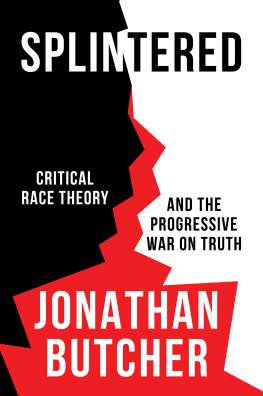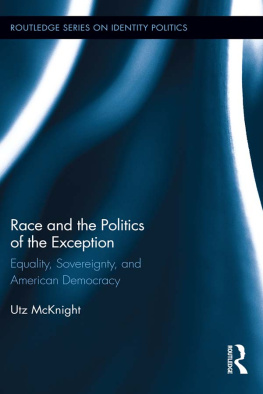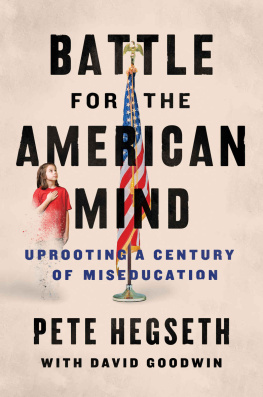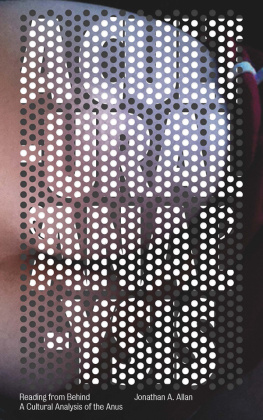
Published by Bombar dier Books
An Imprint of Post Hill Press
ISBN: 978-1-6 3758-266-4
ISBN (eBook): 978-1-6 3758-267-1
S plintered:
Critical Race Theory and the Progressive Wa r on Truth
2022 by Jonathan Butcher
All Right s Reserved
Cover Design by Mat t Margolis
No part of this book may be reproduced, stored in a retrieval system, or transmitted by any means without the written permission of the author and publisher.


Post Hill Press
New York Nashville
posthil lpress.com
Published in the United States of America
DEDICATION
To Pearce, Elijah, Ruth, and Jack
that we may always pursue the truth together.
Table of Contents
W hen Nancy Andersen saw her sons homework assignment just before Thanksgiving in 2019, she started getting really, really scared. Her son, who was attending a private K8 school near Durham, North Carolina, brought home an essay his teacher had given the fourth-grade class, which stated that the first Thanksgiving celebration in the New World resulted in genocide, environmental devastation, poverty, world wars, [and] racism. The Pilgrim heart was one of bigotry, hatred, greed, and self-righteousness.
Nancy was shocked. This was scary and caught me by surprise, Nancy said. In fourth grade, children are as impressionable as they will ever be. School is a carnival of friends, the woody smell of pencils, and a fascination with the crisp edges of textbooks. At that age, the faces of American presidents and seventeenth-century explorers, Martin Luther King, Jr., and Sally Ride still evoke in children the same feelings of awe as pictures of movie stars and athletes. Children have a vague understanding that these people really did exist (or that some still do). To a child behind a desk, a baseball players feats and those of an astronaut are much the same. A multidimensional picture showing that even heroic people are flawed, and the recognition that these flaws rarely make someones entire life worth condemning, are important lessonsbut lessons that are years away from fourth grade.
Nancy learned that her sons school was using material created by Learning for Justice, a group that creates K12 lesson plans based on the idea that race and racism are embedded in institutions and everyday life. School officials were also using lessons from Montessori for Social Justice, an organization trying to dismantle systems of oppression under the assumption that America is systemically oppressive. Montessori for Social Justice leaders released this statement in June 2020: The United States was founded on the oppression, rape, murder, and enslavement of Black people.
We can all agree that some Americans of prior generations failed to live up to the national promise of freedom and opportunity for everyone, regardless of skin color. Slavery, the reconstruction era after the Civil War, and Jim Crow laws all conflicted with the inalienable rights inscribed in the Declaration of Independence and the U.S. Constitution. But to say that America was founded on the oppression, rape, murder, and enslavement of black people and not the pursuit of religious freedom, economic opportunity, discovery, and any number of other reasons people came to the U.S. is a very cynical view of this country.
Furthermore, so much has changed in America over the past sixty years. In The Disuniting of America , first published in 1991, Arthur Schlesinger, historian and one-time advisor to John F. Kennedy, said, There are few better arguments for the Bill of Rights than the revolution in race relations over the last half century.
Steele is right. And surveys find that most parents feel the same as Nancy when she says that she does not want her child being taught that America is evil or that it was founded by bigots.
Nancys experience, though, is becoming common around the country. Her sons school was using instructional materials based on critical race theory, a branch of the Marxist philosophy called Critical Theory, which has been spreading within and among colleges and universities for decades. Now, even teachers are teaching critical race theory in public and private schools, as will be described in the pages of this book.
As critical race theorist Angela Harris writes in Critical Race Theory: An Introduction , Critical race theory not only dares to treat race as central to the law and policy of the United States, it dares to look beyond the popular belief that getting rid of racism means simply getting rid of ignorance, or encouraging everyone to get along.
Translation: critical race theorists, and the critical theorists on which critical race theorists based their ideas, are attacking the basic ideas that make up Americans national identity, represented by the pictures of their Founding Fathers, and the first female astronaut, and so many others who line the walls of any elementary school classroom. Critical theory is a gadfly, as historian Martin Jay once described the worldview, creating doubt in Americans minds about their countrys promises of liberty and opportunity. Critical race theorists added to the original critical theory by saying societys goal is not equality for everyone under the law, but instead is power, including the power to force others to say that they are guilty of harming other people just because of the color of their skin.
This is not innocence, Nancy says. This is not fostering curiosity in a child.
Fed up with the response from school officials when she complained about these lessons in her sons class, Nancy moved her children to a new school. I couldnt trust these people with my kids, Nancy says.

Critical race theory is closer to your childs desk than you may realize. Lawmakers in Washington, DC, are making sure of that. On January 20, 2021, Inauguration Day, President Joe Biden signed seventeen executive ordersmore on his first day on the job than the three previous presidents combined. Most of the orders overturned decisions that outgoing President Donald Trump had enacted, but one of these orders, in particular, demonstrates the stark differences between how Americans on the Right and Left sides of the partisan divide today think about the country that is their home.
In an executive order titled Advancing Racial Equity and Support for Underserved Communities through the Federal Government, President Bidens administration claimed ownership of American history, telling teachers and other educators to focus on racist acts and systems in Americas past . Since he who owns the past owns the future, as George Orwell recognized in 1984 , the new presidents order has profound implications for this and future generations of Americans. The Oval Office is two states and hundreds of miles away from Nancy Andersens sons former school, with its smell of pencils and classrooms full of bright-eyed children, but both sites were battlegrounds where adults of this generation were deciding how to explain their countrys heritage to the next.
In the Advancing Racial Equity order, President Biden revoked a commission that President Trump had created in the waning months of his presidency. In September 2020, President Trump had called for the creation of a 1776 Commission, a group of scholars whom President Trump would later task with promoting patriotic education. President Trump said that the commission was to enable a rising generation to understand the history and principles of the founding of the United States in 1776 and to strive to form a more perfect union.
Next page








